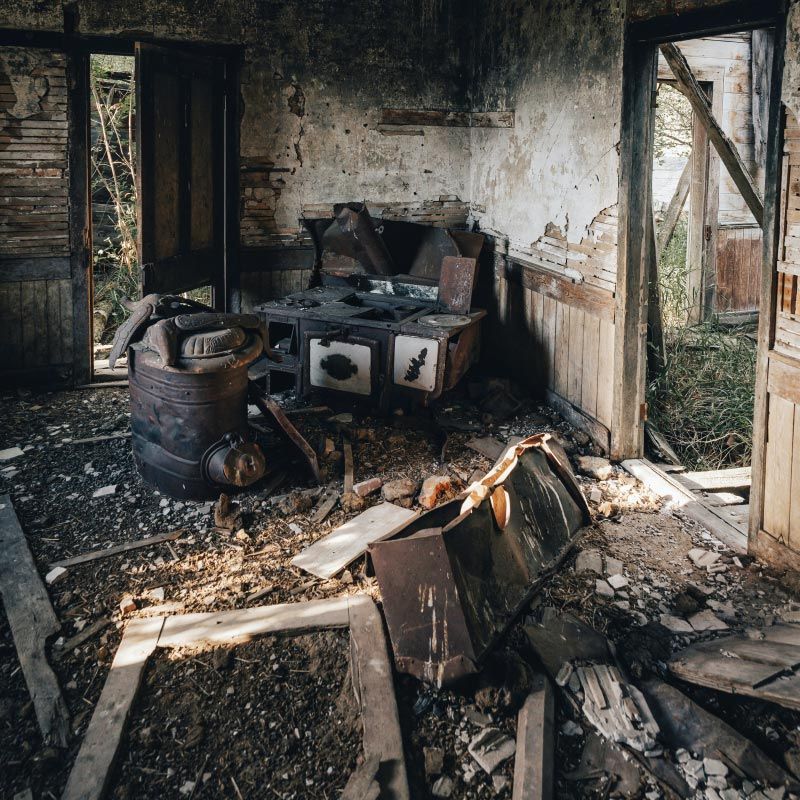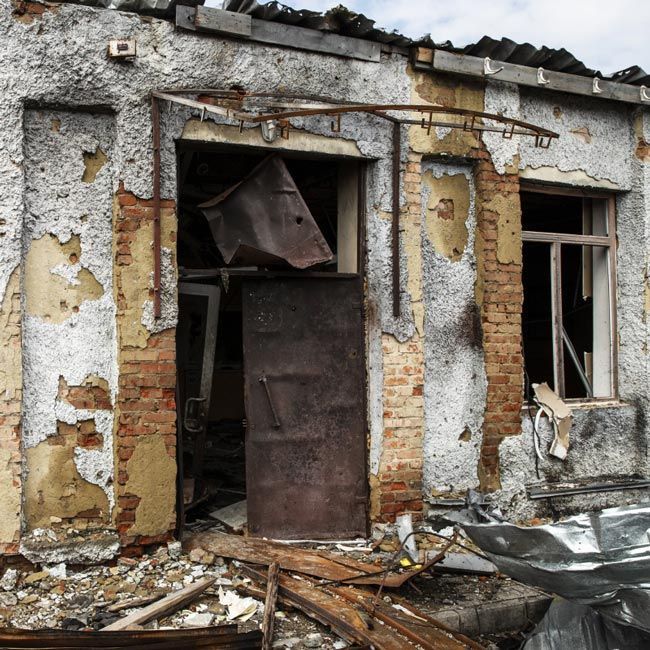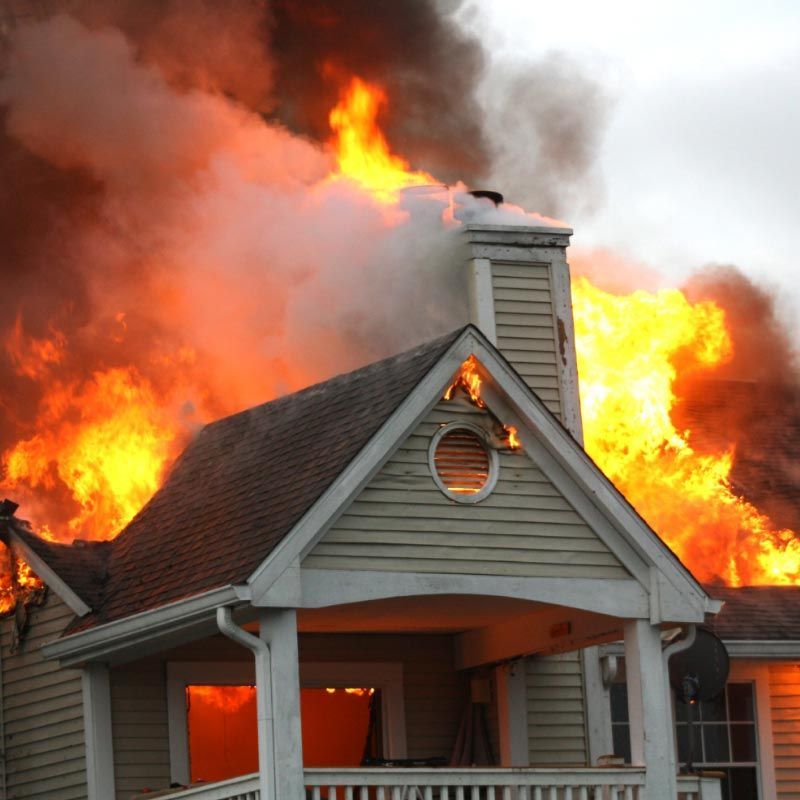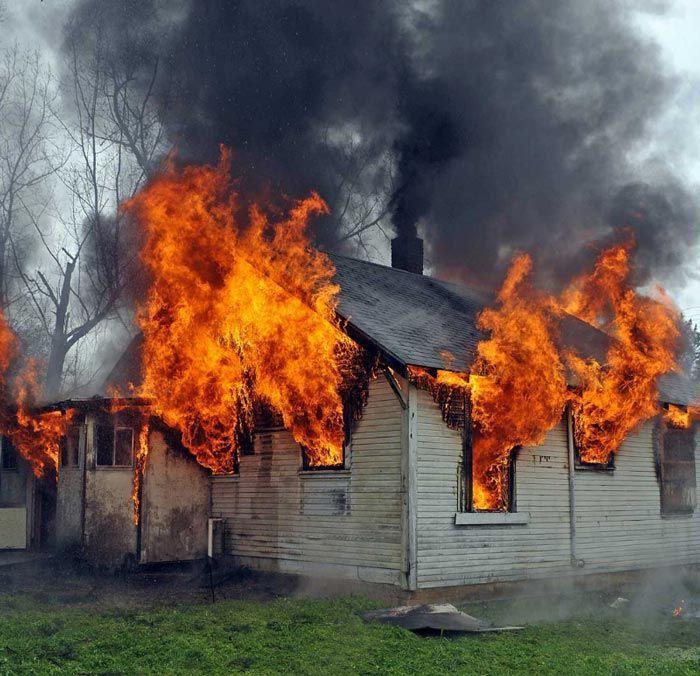How Does Fire Damage Affect Property Values?
Free Offer Form
Selling a fire damaged house is possible, though may be difficult with a real estate agent. Selling as-is to a National cash buyer is one of the best options. Fill out the form below to get started and find out what your property is worth.
A house fire can impact a property's value on the real estate market through factors like damage, repairs, and the buyer's considerations.
We'll discuss the impact of fire damage on attribute values, communities, and economies, affecting many homeowners, real estate professionals, insurance companies, and policymakers.
We will answer "Does a house lose value after a blaze?" and disaster mitigation.
Analyzing How Fire Damage Affects Property Value
This section explores the correlation between fire damage and land value. It's essential to understand the process of selling a fire-damaged house to investors or homeowners.
Defining Property Value in the Context of Fire Damage
Land value or the estimated monetary worth of real estate can change after wildfires, structural fires, or other fire-related incidents.
When selling a house after a fire, homeowners can receive a generous cash offer for their assets, reflecting the decreased value caused by the extensive damage.
If you're having trouble finding a cash buyer, home insurance companies will sell your house via a cash offer. They will handle the closing costs and make the selling process easier.
- Pre-Fire Value: This is the property's estimated worth before the fire. It considers the area's location, size, condition, and comparable sales.
- Post-Fire Value: Post-fire land value typically has a lower price due to necessary repairs and rehabilitation, ranging from minor smoke damage and water damage to destruction. However, you can get a fair price for your property after repairs.
- Repaired Value: The property's value may recover post-fire repairs if you restore it to pre-fire condition. This will help you sell it for a fair cash offer.
- Market Perception: Market perception significantly impacts a property's resale value, with potential buyers hesitant to purchase a fire-damaged home, even after it's fully repaired.
- Insurance Coverage: Insurance coverage significantly influences value in fire and smoke damage scenarios, with well-insured properties recovering more pre-fire value. Homeowners insurance should be able to provide or request a fair cash offer moving forward.
- Location and Demand: The local real estate market's conditions and demand significantly impact land value post-fire damage, whether you sell the home as-is or after repairs.
Causes of Fire and Their Impacts on Property Value
Common causes of fires include natural disasters, wildfires, and wildfires with varying severity and impact on land value. These can all affect the cash offer you receive for a fire-damaged house.
- Wildfires: A wildfire can lower potential cash offers due to increased blaze and smoke damage risk.
- Structural Fires: Structural fires caused by accidents, electrical faults, kitchen mishaps, or arson can result in diminished property value before the homeowner can repair the house.
- Arson: Arson is the intentional burning of assets or structures, causing significant damage and potentially reducing its value. Contact a fire investigator if you suspect arson. Making repairs can improve the cash offer you receive.
- Electrical Problem: Electrical fire due to faults like outdated wiring, overloaded circuits, or equipment failures can cause fires and impact property value. Conduct an HVAC inspection if the fire was caused by poor ventilation or a faulty heater.
- Natural Disasters (e.g., Earthquakes, Hurricanes): Natural disasters like earthquakes and hurricanes can cause severe damage, including secondary fires, power outages, and water damage, significantly impacting attribute values in disaster-prone regions.
- Community Infrastructure: Firefighting infrastructure, like nearby stations and hydrants, can mitigate fire damage, potentially leading to higher land values due to the perceived safety of the area.
NOTE: Even if you plan to sell your house as-is, it's best to keep detailed records from the beginning. It is important to disclose fire damage when selling a house, whether the event was recent or years ago. Being open about the repair job informs future buyers that they're buying a remodeled property with new components. After that, you can set a closing date.
The Immediate Aftermath: Short-Term Impacts on Property Values
The immediate aftermath of a blaze can significantly impact a property's value, influenced by factors like the following.
- Contact a fire marshal for evacuation
- Damage assessment by the insurance company
- Insurance claim after the house fire checklist
- Market perception
- Economic and community effects
- Emergency response and evacuation status
- Investor opportunities
Land values may decline initially due to damage but recover over time.
After contacting a disaster relief organization, you can only enter the residence after the fire department confirms it is safe.
Inform utility providers about the blaze and request emergency shut-off service before beginning to repair the structure.
Can I Sell a Fire Damaged House National?
Yes. You can sell a fire-damaged house. However, it may be harder to sell in the local National real estate market in as-is condition. You would have to make repairs and possibly rebuild most parts of your house before a buyer takes interest in the property. Your best option when selling a fire-damaged house is a cash buyer. They buy burned houses as-is so you don't need to spend money on repairs. They'll handle all the cleanups and renovations for you, however, expect that their offer may be below the cash value of your property.
Rehabilitation of Fire-Damaged Properties and Property Values
The section investigates the link between the rehabilitation of fire-damaged residences and their real estate values.
The Role of Fire Insurance in Property Value Restoration
Homeowners insurance is vital for property value restoration, providing financial protection against losses from fire-related incidents. It covers structural repairs, replacements, temporary housing and living expenses.
It expedites all the repairs, prevents further property damage, and maintains property value.
The Costs and Process of Property Restoration
Conducting a thorough assessment to determine the potential cost of restoring fire damage will help you plan for proper repairs and renovations.
Property restoration costs after fire damage vary based on damage extent, house type, local building codes, and material quality.
Expect an assessment from the property insurance company, immediate cleanup, structural and plumbing repairs, HVAC system repairs, interior restoration, smoke and soot cleanup, and content repairs.
You may also need permits and additional safety measures.
- Initial Assessment: The rebuilding process begins with the insurance company, which will assess the damage. This assessment will help you estimate the cost of rebuilding.
- Insurance Claims Process: House owners often file an insurance claim to cover the full value of restoration costs. An insurance adjuster from your insurance company determines the coverage amount based on the damages.
- Selecting Contractors: Hire a reputable contractor experienced in restoration for repairs. Ensure you choose a licensed, insured, and experienced contractor.
- Planning and Permits: Contractors develop a detailed restoration plan, which may include obtaining necessary permits from the local authorities.
- Restoration Work: The restoration work begins. This involves repairing structural damage, addressing interior issues, thorough cleaning, and restoring the fire-damaged house to its pre-fire condition.
- Inspections: Local building inspectors may conduct inspections at various stages of the restoration process to ensure compliance with codes and safety standards.
- Final Cleanup and Inspection: After complete restoration work, a final cleanup and inspection are conducted to ensure the house is habitable and free from fire-related hazards.
- Occupancy or Sale: Once the property is fully restored and passes all inspections, it can be reoccupied or put on the market for sale or rent.
NOTE: Determine the home's replacement cost by hiring an appraiser or using an online cost estimator. After finding a replacement cost, compare it to the remaining balance on the mortgage.
The Impact of Rehabilitation on Property Values
Rehabilitation after fire damage enhances land values by improving the home's curb appeal, meeting building codes and safety standards, and offering a safer investment.
It also increases resale potential. The impact of rehabilitation varies depending on location, market conditions, and buyer preferences.
Long-Term Impact of Fire on Property Values
Fires significantly impact land values, affecting real estate markets and communities for years. Understanding fires' effects is crucial for homeowners, investors, policymakers, and the public.
Effect of Stigma on Property Values After a Fire
A negative perception of a property's fire damage history can impact its value, reducing buyer interest and appraisals.
To mitigate this, owners should ensure rehabilitation, transparency, professional real estate appraisal, and educate buyers about the property's repairs.
The Role of Location and Fire Risk in Determining Long-Term Property Values
Location and blaze risk significantly influence long-term land values, particularly in areas prone to wildfires or historical blaze incidents.
Insurance costs in high-risk areas can also negatively affect land values. Blaze mitigation measures, community preparedness, market sentiment, and climate change considerations also impact land values.
Regional Impact: Fire Damage and Property Values in Specific Markets (e.g., Massachusetts)
While the general principles of how fire damage affects property values hold true across the board, regional factors can significantly influence the extent of the impact and the recovery process. Local real estate market dynamics, state-specific regulations, building codes, and even regional climate risks play a crucial role in determining the ultimate effect on a property's worth after a fire. Understanding these local nuances is vital for both sellers looking to offload a fire-damaged property and buyers considering such an investment.
For instance, in a state like Massachusetts, specific considerations come into play. The state has stringent building codes and environmental regulations that can impact the cost and complexity of repairs. The demand for housing in certain Massachusetts areas might mean that even fire-damaged properties, if priced correctly, can attract quick interest, especially from investors familiar with the local renovation landscape. Conversely, in areas with a slower market or a higher inventory of properties, a fire-damaged home might linger longer and see a more substantial value decrease. Insurance coverage nuances specific to the region, such as requirements for coastal properties or older homes prevalent in New England, can also affect the financial feasibility of restoration and, consequently, the property's market value.
Furthermore, the perception of fire risk and the history of fires in a particular neighborhood or town within a state can create localized stigma. In areas prone to wildfires or with older, densely packed housing stock, buyers might be warier, leading to a more pronounced dip in value post-fire. Disclosure laws also vary by state, and Massachusetts has its own requirements regarding what sellers must reveal about a property's history, including fire damage. This transparency can affect negotiations and the final sale price. Therefore, when assessing fire damage and property values, a national overview provides a baseline, but a deep dive into the specific conditions of the local market, like that of Massachusetts, is essential for an accurate valuation and strategy.
Factors Influencing Value in Specific States like Massachusetts
Several key factors can cause the impact of fire damage on property values to vary significantly from one state or region to another, using Massachusetts as a relevant example:
- State and Local Building Codes: Massachusetts, like many states, has specific building codes that dictate the standards for repairing fire-damaged structures. These codes can be more stringent for older properties or in certain municipalities, potentially increasing rebuilding costs and timelines. The extent to which a repaired property must be brought up to current code (not just pre-fire condition) can heavily influence restoration expenses and thus its post-repair market value.
- Real Estate Market Conditions: In a hot real estate market with high demand and low inventory, as seen in parts of Massachusetts, a fire-damaged property might still fetch a relatively higher price or sell more quickly than in a buyer's market. Investors might be more willing to take on complex projects if the potential ROI is high due to strong local property appreciation. Conversely, in slower markets, the discount for a fire-damaged property will likely need to be much steeper.
- Insurance Landscape: State-specific insurance regulations and the general availability and cost of homeowners insurance (especially for properties with a history of claims like fire damage) can impact buyer appeal. In Massachusetts, factors like proximity to the coast or the age of the home can already affect insurance rates, and a fire can exacerbate this, influencing what a buyer is willing to pay.
- Contractor Availability and Costs: The cost and availability of qualified contractors to perform fire damage restoration can vary regionally. In areas with high construction demand or after a widespread disaster, these costs can escalate, impacting the net value retained by the seller or the profit margin for a flipper.
- Disclosure Laws: Massachusetts has specific property disclosure requirements. How fire damage is disclosed, and the thoroughness of that disclosure, can impact buyer confidence and the negotiated price. Full transparency is crucial but also lays bare the extent of the damage, which will be factored into offers.
Understanding these state-specific elements is crucial for accurately assessing how fire damage will affect a property's value in a particular locale like Massachusetts, as opposed to relying solely on national averages or general assumptions.
Navigating the Market: Selling or Buying in a Specific Region
When dealing with a fire-damaged property in a specific region such as Massachusetts, both sellers and buyers need to adopt a localized strategy. Sellers should research recent sales of comparable damaged and renovated properties within their specific town or county to set a realistic price. Obtaining detailed quotes from local, reputable contractors familiar with Massachusetts building codes is essential to understand the true cost of repairs, which will heavily influence the property's marketability. Highlighting any unique local advantages, such as proximity to amenities or strong school districts, can help offset some of the negative perceptions associated with fire damage.
Buyers, on the other hand, should engage local experts, including real estate agents specializing in distressed properties and inspectors with experience in fire damage assessment within Massachusetts. They need to be thoroughly aware of local zoning laws, permit requirements, and potential environmental concerns (e.g., asbestos or lead paint in older Massachusetts homes) that might be uncovered during restoration. Financing can also have regional quirks; some local banks or credit unions might have specific programs or stricter criteria for lending on damaged properties. Due diligence, tailored to the specific regulations and market conditions of the area, is paramount to making a sound investment.
Ultimately, whether selling or buying, a keen understanding of the local context transforms the challenge of a fire-damaged property into a more manageable transaction, where expectations are realistic and decisions are well-informed by the prevailing conditions of that specific market.
The Process of Selling Fire Damaged Property to a Cash Buyer
The process of
sell your house after a fire and getting a cash offer for a burned house is pretty much the same as any property type. However, it is best if you can contact your home insurance company first before getting an offer for your house after a fire. Your National home insurance company can help assess the extent of the fire damage as well as the repair costs. This can help you decide whether selling a house as-is to a cash buyer is really the right path to take. Once you have decided that you really want to get a cash offer, here are the next steps you should take.
Important note: This doesn't apply to all cash buying companies.
1. Request a Cash Offer
You can easily find cash buyers in your National area by searching online. Once you found a reputable cash buyer, head over to their website to fill out a form or give them a call to ask for a cash offer. Most cash buyers and real estate investors give no-obligation cash offers so you can still ask other cash buying companies how much they can buy your fire-damaged property. If you are unsure about the background of a cash buyer, you can always ask them for proof of their source of funds.
2. Welcome the Cash Buyer into Your Home
The cash buyer or real estate investor may want to check your fire-damaged property for the repairs and improvements it needs, especially its roofing, walls, foundation, etc. You won't have to pay for these repairs when selling a National house to them, but experienced home buyers or real estate investors consider repair costs to make an accurate cash offer.
3. Review the Contract and Sign
Once you accept the cash buyer's offer on your fire-damaged home, they would furnish a sales contract and send it to you electronically. You will be given time to go over the terms and ask questions. After everything is settled, sign the contract to make the deal with the National cash home buyer official.
4. Closing
During closing, expect less paperwork since there are no lenders involved. After you have signed the minimal necessary paperwork and the National deed is transferred to the cash buyer's name, you'll get your cash in your bank account. If you aren't confident attending the closing by yourself, bring a real estate attorney with you.
5. Set Your Preferred Day to Move-Out
If the property has minor fire damage and you are still living in it, communicate to the cash home buyer when you want to move out. This is also a good time to ask for a sale-leaseback agreement if you don't have a place to crash on while you are still looking for a new National home.
Practical Considerations When Buying a Fire-Damaged Property
The section emphasizes assessing damage, managing restoration costs, and resale values when buying fire-damaged homes to transform them into valuable assets.
Before deciding to find and invest in fire-damaged properties, it's crucial to thoroughly assess the extent of damage and potential renovation costs.
Identifying a Good Deal: Buying a Fire-Damaged Property Below Market Value
To buy a fire-damaged home below market value, conduct a thorough inspection, estimate potential repair costs and be aware of local regulations.
Determine the potential resale value and create a realistic renovation budget.
Potential Risks of Buying Fire-Damaged Properties
It's important to understand the potential risks when investing in fire-damaged homes like the following.
- Hidden damage
- Safety hazards
- Financial investment
- Insurance challenges
- Financing obstacles
- Regulatory compliance
- Environmental concerns
- Overleveraging
Financing Options for Purchasing Fire-Damaged Properties
Due to their unique risks and conditions, fire-damaged homes can be difficult to finance. However, there are several financing options available for investors and buyers. Here are some options.
- Conventional mortgage loan
- VA Renovation Loans
- Fannie Mae HomeStyle Renovation Loans
- Freddie Mac CHOICERenovation Mortgages
- Hard money loans
- Personal savings or investor capital
- Seller financing
- Renovation loans from local banks
What Happens to Property Values After a Fire: Putting It All Together
This section delves into the intricate factors affecting land values.
Summary of The Impact of Fire on Property Values
Fires can significantly reduce a home's resale value, necessitating immediate rehabilitation and insurance.
Financing options include VA renovation loans, conventional mortgages, seller financing, and hard money loans.
Key Takeaways and Implications for Buyers and Sellers
Here are the key takeaways and implications of a home fire.
For Buyers:
Distressed properties offer lower-than-market real estate acquisitions, but buyers must be financially prepared for rehabilitation costs.
Alternative financing options, safety, compliance with local codes, market research, and stigma awareness can help mitigate the stigma surrounding these properties.
For Sellers:
To boost a property's resale price, those who are selling a house should:
- Invest in comprehensive rehabilitation
- Document the process and get an official report
- Set competitive pricing
- Collaborate with a real estate agent
- Reduce stigma around the damage
- Set realistic expectations for the timeline for selling a house and potential resale value
This will ensure the fire-damaged property is in good condition, attract potential buyers, and maintain its appeal.
Frequently Asked Questions
This section explores the impact of fire damage on a home's real estate value, answering common questions for those curious about the process of selling fire-damaged property.
Can Fire Damage Permanently Decrease Property Value?
Yes, fire damage can permanently decrease land value, especially if the damage is extensive and not adequately repaired or if the property's location has a history of repeated fires.
Is It Worth Buying a Fire-Damaged Property?
The answer depends on your ability to tackle renovation challenges and attract potential investors for fire-damaged homes that are willing to take on the property.
Investing in a fire-damaged house can be profitable if you're aware of the associated risks and renovation costs, but due diligence is essential.
How Does Fire Insurance Affect Property Values After a Fire?
Fire insurance protects homeowners and investors financially, expediting property restoration, reducing expenses, and mitigating potential long-term value losses following a blaze.
What Is the Process of Restoring a Fire-Damaged Property?
The process involved in rebuilding a house is as follows:
- Safety assessment by the insurance company
- Documentation of damage
- Processing of insurance
- Securing the property
- Debris removal
- Structural repair
- Restoration of the property and structures by the restoration company
- Interior restoration
- Cosmetic enhancements
- Safety upgrades
- Final inspection
- Quality assurance
- Insurance approval
- Market Preparation
- Listing the property for home sale or rent
Can Property Values Recover from Major Fires in High-Risk Areas?
Property values can recover from major house fires in high-risk areas. Fire-damaged houses that are repaired and restored properly can bounce back in value on the real estate market.
Still, recovery depends on rehabilitation effectiveness, insurance coverage, community resilience, and market sentiment, with long-term recovery possible with proper planning and mitigation measures.
Conclusion
Fire damage affects a home's price tag through various factors, including immediate aftermath and long-term resilience. Rehabilitation, insurance, and safety compliance can restore its value.
Understanding location, stigma, and market dynamics is crucial for real estate sellers and homeowners alike.
Final Thoughts and Recommendations
Fire damage affects a home's resale value, requiring proactive measures, transparency, and effective rehabilitation.
To ensure resilience, homeowners, investors, and communities should implement mitigation measures, get good insurance coverage and adhere to safety regulations.
This holistic approach helps individuals and communities navigate challenges and preserve their investments' value.
National Resources
- Selling a Fire Damaged House National
- Selling Inherited Property National
- Selling a House in Probate National
- How to Sell a House by Owner National
- How to Sell Rental Property National
- Stop Foreclosure National
- Selling a House during Divorce National
- How to Sell a Hoarder House National
- Can You Sell a Condemned House National?
- Can You Sell a House in Foreclosure National?
- How to Sell Rental Property with Tenants National
- Taxes on Selling a House National
Free Offer Form
Author: Chris Charles
We buy fire damaged houses because we like taking on the challenge and making a win win for sellers looking to sell. We work with our partners nationwide and are experienced in dealing with the city if its already been condemned. Request a cash offer to have a chat with us today.
Sell Fire Damaged House for Cash Quick
Sell Your House Fast, To A Legitimate House Buying Company You Can Count On. ✔️ Free, Easy & ✔️ No Pressure Process. Find Out How We Buy Houses!
Sell Fire Damage House in California
Sell Fire Damaged House in Ohio
Sell Fire Damaged House In North Carolina
Sell Fire Damaged House In Michigan
Sell Fire Damaged House In Massachusetts
Sell Fire Damaged House In Colorado
Sell Fire Damaged House In Minnesota
Sell Fire Damaged House In South Carolina
Sell Fire Damaged House In Alabama
Sell Fire Damaged House In Louisiana
Sell Fire Damaged House In New Hampshire
Sell Fire Damaged House In Maine
Sell Fire Damage House in Texas
Sell Fire Damaged House in Florida
Sell Fire Damaged House In New Jersey
Sell Fire Damaged House In Virginia
Sell Fire Damaged House In Indiana
Sell Fire Damaged House In Kentucky
Sell Fire Damaged House In Oregon
Sell Fire Damaged House In Oklahoma
Sell Fire Damaged House In Connecticut
Sell Fire Damaged House In Utah
Sell Fire Damaged House In Rhode Island
Sell Fire Damaged House In Delaware
Sell Fire Damaged House in Pennsylvania
Sell Fire Damaged House in New York
Sell Fire Damaged House In Washington
Sell Fire Damaged House In Arizona
Sell Fire Damaged House In Missouri
Sell Fire Damaged House In Nevada
Sell Fire Damaged House In Iowa
Sell Fire Damaged House In Arkansas
Sell Fire Damaged House In Mississippi
Sell Fire Damaged House In Kansas
Sell Fire Damaged House In North Dakota
Sell Fire Damaged House In Alaska
Sell Fire Damaged House in Georgia
Sell Fire Damaged House in Illinois
Sell Fire Damaged House In Tennessee
Sell Fire Damaged House In Maryland
Sell Fire Damaged House In Wisconsin
Sell Fire Damaged House In New Mexico
Sell Fire Damaged House In Idaho
Sell Fire Damaged House In Nebraska
Sell Fire Damaged House In West Virginia
Sell Fire Damaged House In Hawaii
Sell Fire Damaged House In Vermont






